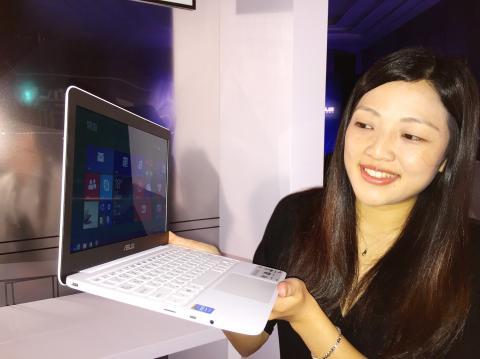Asustek Computer Inc (華碩) yesterday said it expects to see sales volume growth of more than 30 percent at this year’s IT Month information technology exhibition, driven by its newly launched EeeBook X205.
Priced at NT$6,680 (US$216), the cloud-based laptop that runs Windows is expected to emerge as a new segment in the notebook computer business, Asustek sales general manager Kevin Lin (林福能) told a press conference ahead of the exhibition, which is set to run from Saturday to Dec. 7.
The 11.6-inch Windows 8.1 notebook is equipped with 2 gigabytes (GB) of RAM and 32GB of storage that comes with 500GB of cloud storage from Asustek and another 1 terabyte from Microsoft Corp.

Photo: Chen Ping-hung, Taipei Times
Weighing less than 1kg, the EeeBook X205 can be viewed as an extension of the popularity of smart handheld devices, as consumers get accustomed to storing their data in the cloud, Lin said.
“Most people are more familiar with Windows operating system, which gives EeeBook an advantage in the market,” Lin added.
Despite Asustek’ optimism, Yuanta Securities Investment Consulting Co (元大投顧) is conservative about the device’s potential revenue contribution, saying that earnings from hardware would be reduced because it is a low-cost product.
“Consumer behavior and a stable connectivity environment” are potential barriers that the EeeBook X205 must overcome, a Yuanta analyst who declined to be named told the Taipei Times by telephone.
Not every consumer is open to the idea of putting important data in the cloud, he said.
Asustek is also set to launch its 13.3-inch Chromebook C300 MA at the exhibition.
The company has sold 1,000 Chromebox desktop computers in Taiwan since they were launched on Oct. 31 and plans to sell another 1,000 units at the trade show, Lin said.
Yuanta said the Chromebook looks promising because of demand from the education sector.
However, both the Chromebook and EeeBook X205 are likely to encounter difficulties in emerging markets due to an unstable connectivity environment, he said.
“In the short term, Asustek might see losses from its EeeBook segment, but over the medium and long term, we think it is a positive strategy to add a cloud-based notebook to the market,” the Yuanta analyst said.
He said that based on Asustek’s guidance for this quarter, notebook shipments are expected to grow 7.84 percent, outpacing the industry, which is forecast to be flat or decline by as much as 5 percent.
Lin said that Asus has sold more than 1 million Zenfone smartphones domestically since the product hit the market in April and more than 1 million units per month worldwide, adding that the company expects the forceful sales momentum to continue.
For tablets, Lin said sales of the Asus 7-inch PadFone accounts for 60 percent of its tablet segment, while the 8-inch and 10-inch models account for 40 percent.
He said he expects sales of the 7-inch model to decline slightly, while the 8-inch picks up next year, as users increasingly favor larger-screen smartphones.

Sweeping policy changes under US Secretary of Health and Human Services Robert F. Kennedy Jr are having a chilling effect on vaccine makers as anti-vaccine rhetoric has turned into concrete changes in inoculation schedules and recommendations, investors and executives said. The administration of US President Donald Trump has in the past year upended vaccine recommendations, with the country last month ending its longstanding guidance that all children receive inoculations against flu, hepatitis A and other diseases. The unprecedented changes have led to diminished vaccine usage, hurt the investment case for some biotechs, and created a drag that would likely dent revenues and

Macronix International Co (旺宏), the world’s biggest NOR flash memory supplier, yesterday said it would spend NT$22 billion (US$699.1 million) on capacity expansion this year to increase its production of mid-to-low-density memory chips as the world’s major memorychip suppliers are phasing out the market. The company said its planned capital expenditures are about 11 times higher than the NT$1.8 billion it spent on new facilities and equipment last year. A majority of this year’s outlay would be allocated to step up capacity of multi-level cell (MLC) NAND flash memory chips, which are used in embedded multimedia cards (eMMC), a managed

CULPRITS: Factors that affected the slip included falling global crude oil prices, wait-and-see consumer attitudes due to US tariffs and a different Lunar New Year holiday schedule Taiwan’s retail sales ended a nine-year growth streak last year, slipping 0.2 percent from a year earlier as uncertainty over US tariff policies affected demand for durable goods, data released on Friday by the Ministry of Economic Affairs showed. Last year’s retail sales totaled NT$4.84 trillion (US$153.27 billion), down about NT$9.5 billion, or 0.2 percent, from 2024. Despite the decline, the figure was still the second-highest annual sales total on record. Ministry statistics department deputy head Chen Yu-fang (陳玉芳) said sales of cars, motorcycles and related products, which accounted for 17.4 percent of total retail rales last year, fell NT$68.1 billion, or

In the wake of strong global demand for AI applications, Taiwan’s export-oriented economy accelerated with the composite index of economic indicators flashing the first “red” light in December for one year, indicating the economy is in booming mode, the National Development Council (NDC) said yesterday. Moreover, the index of leading indicators, which gauges the potential state of the economy over the next six months, also moved higher in December amid growing optimism over the outlook, the NDC said. In December, the index of economic indicators rose one point from a month earlier to 38, at the lower end of the “red” light.